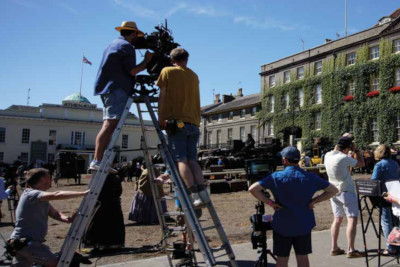So, your local authority is sold on the idea of attracting more filming. Good work. Productions are spending up to £100,000 a day in local neighbourhoods, on accommodation, transport, catering, and renting homes and businesses as locations.
There’s also the feel-good factor – the economic impact of increased tourism, and attracting more businesses to your area because of its enhanced reputation. Why are we seeing so much opportunity with film productions? Thanks to tax incentives and the weaker pound, the UK’s film industry is now worth £1.6bn, it’s grown by 78% since 2014.
Now, how do you get started?
1. You’ll need a film officer
This is usually a full-time member of staff, who acts as the key point of contact for the film industry. They take calls from film location managers and fulfil their requests for permits.
When they are issuing licences and permits on behalf of your authority, they make sure all local filming conforms to Film London’s the code of practice. This covers everything from temporary structures, pyrotechnics and protecting residents, to film insurance and risk management.
They work with residents and businesses to protect them from disruption. They also work with other bodies like the civil aviation authority, local police, transport providers, nature groups, canal trusts, any other group affected by the shoot.
2. You’ll need film champions across the departments
Your film officer will be liaising across many departments on a daily basis. Identify those officers who are willing and able to help, and quick to respond.
They will include champions in:
Parking
Housing
Property
Recreation
Traffic management and environmental services for roads and pavement access
Events, to make sure locations aren’t already booked up for a festival or street party.
Even cemeteries
3. Adopt a sense of urgency
Film productions will return time and again to those neighbourhoods where they know the permits will be processed on time. They need very quick responses. They need people to pick up the phone or answer an email urgently. They then need almost immediate action to make the licensing possible. If they don’t think they’ll get that permit in their hands in good time, they’ll move on.
Just as they could film Turkey in Croydon for American Assassin, Whitehall in Manchester for Darkest Hour or Morocco In Suffolk for Ridley Scott’s All the Money in the World, your locations could be doubled anywhere else.
4. You’ll also need to be patient and philosophical
For reasons completely outside the location manager’s control, they might move on. This is a very flexible and mobile industry.
Scenes are cancelled at the last minute, filming is re-scheduled. Sometimes a shoot is planned around the American star wanting to film in the UK so they can bring their children during school holidays.
It’s important to be gracious, because those same location managers will be back, if they know the service is good.
5. Offer discounted office space, luring the entire production
Every shoot needs a production office, somewhere they’ll operate out of for the length of the shoot – that might be six weeks, sometimes six months.
That means production spend will go into local business and residents pockets each day for the duration of the shoot. And nearby locations will become more attractive, adding even more business to the books.
Do you have empty office space, or even school or hospital space, that the production could work out of?
The Monty Python team for example, used Islington’s Ashmount School as a production office while they were filming Absolutely Anything.
The space might also be offered in exchange for trainee placements or entry level roles for local young people. Youngers, filming in Peckham in Southwark is a great example.
6. Be open minded about how you can help
It sounds boring but the best way to attract filming is a commitment to handle parking quickly and effectively. A good council provides a parking permit on the same day, a difficult council will insist on 14 days’ notice for a parking suspension.
Accommodating parking could mean a unit base of up 150 vehicles for big productions, more often it is, on average, seven technical vehicles, 12 large unit facilities and 25 cars.
Multi-level car parks like Secure Parking on Bloomsbury Square in Camden, or parking at recreation grounds such as Croydon’s Addington Park are invaluable resources.
Period shoots will always need to clear the area of modern cars. So, it’s important to work with residents to offer alternative parking, make sure deliveries can get through, and be aware of whether sick or pregnant residents might need urgent access to their cars.
Remember that filming on housing estates is not always about gritty crime dramas. Ikea, Lucozade and Selfridges have produced gorgeous work on housing estates.
Don’t forget your cemeteries.
Lambeth officers helped out Sean Penn’s The Gunman by digging the production a fake grave and crematorium staff in Islington even played onscreen roles in Rellick.
Your own council office can double as anywhere. Suffolk County Council’s Endeavour House in Ipswich played a slick office in the City of London.
Don’t forget your old town hall and other buildings. In The Crown, Bromley’s Old Town Hall played Conservative Party headquarters in the 1950s, with Churchill arriving amid 150 onlookers.
Your parks can double as the countryside like Southwark’s Burgess Park did for Suffolk in Fearless.
And don’t forget your historic treasures like Danson House in Bexley (pictured above), that hosted Tom Hardy in Taboo.
7. You will need great software
You need a really good computer system to administer the permits and take payments. They should capture every update and make sure everyone involved in the decision-making process can see what’s going on. It should retain records of all decisions and permits. And it should accept online payments from anywhere, via phone and tablets as well as PCs, at any time.
Remember, your film officer will be liaising with residents and business outside your authority departments, along with other agencies like Transport for London, the Civil Aviation Authority, the local police and so on. Ideally your system will retain all their contact details and all your communication with them.
Hands up, we are affiliated with FilmApp from Apply4 Technology, and we must point out that other software is available.
8. Still not sure?
Some local authorities ask themselves whether it’s worth the bother. Some even believe film productions are welcome to come along without permits.
Remember, reputable productions will want permits. They need them for legal reasons when contracts for distribution, for example, are being drawn up. The companies they are dealing with need to be sure they had permission every step of the way. Every document will need to be in order.
Most residents will want to be reassured that they are being protected from disruption, or worse, damage to their neighbourhoods.
The tenants and residents group of the Alexandra & Ainsworth estate in Camden has raised more than £40,000 through film associated activity since 2013, by hiring out its hall, for example.
Even more importantly, productions are offering local young people a leg up in the business, providing work experience and entry-level job opportunities. This has become the norm and we’ve seen it with productions from James Bond: Spectre, American Assassin, Criminal, Our Loved Boy, The Durrells and Guerrilla, just to name a few.
Some quite like the opportunity to see stars outside their front door. Some even find themselves hosting stars, like when Meryl Streep was filming Suffragette.
Karen Everett is CEO of Apply4, FilmFixer and Screen Suffolk




